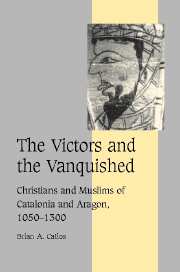Book contents
- Frontmatter
- Contents
- List of figures
- List of maps
- List of tables
- Acknowledgments
- Note on the citation of sources, dates, places, and names
- Glossary
- List of abbreviations
- INTRODUCTION
- Part I Muslim domination of the Ebro and its demise, 700–1200
- Part II Muslims under Christian rule
- Part III INDIVIDUAL AND COMMUNITY IN THE CHRISTIAN EBRO
- INTRODUCTION
- CASE STUDY 1: FISCAL AND CONFESSIONAL IDENTITY: THE GALIPS, TEMPLAR VASSALS IN ZARAGOZA (1179–1390)
- CASE STUDY 2: FRANQUITAS AND FACTIONALISM IN DAROCA: THE LUÇERA FAMILY VS. THE ALJAMA (1267–1302)
- CASE STUDY 3: LITIGATION AND COMPETITION WITHIN THE MUSLIM COMMUNITY: THE ABDELLAS OF DAROCA (1280–1310)
- CASE STUDY 4: ADMINISTRATIVE CORRUPTION AND ROYAL COMPLICITY: ABRAHIM ABENGENTOR, ÇAUALQUEM OF HUESCA (1260–1304)
- CASE STUDY 5: OVERLAPPING AGENDAS: THE CAREER OF MAHOMET, ALAMINUS OF BORJA (1276–1302)
- CASE STUDY 6: THE GOOD, THE BAD, AND THE INDIFFERENT: CHRISTIAN OFFICIALS IN THE EBRO REGION
- PERSONAL HISTORIES: THE INDIVIDUAL, WITHIN THE COMMUNITY AND BEYOND
- Conclusions
- Appendices
- Select bibliography
- Index
- Cambridge Studies in Medieval Life and Thought Fourth series
PERSONAL HISTORIES: THE INDIVIDUAL, WITHIN THE COMMUNITY AND BEYOND
Published online by Cambridge University Press: 08 January 2010
- Frontmatter
- Contents
- List of figures
- List of maps
- List of tables
- Acknowledgments
- Note on the citation of sources, dates, places, and names
- Glossary
- List of abbreviations
- INTRODUCTION
- Part I Muslim domination of the Ebro and its demise, 700–1200
- Part II Muslims under Christian rule
- Part III INDIVIDUAL AND COMMUNITY IN THE CHRISTIAN EBRO
- INTRODUCTION
- CASE STUDY 1: FISCAL AND CONFESSIONAL IDENTITY: THE GALIPS, TEMPLAR VASSALS IN ZARAGOZA (1179–1390)
- CASE STUDY 2: FRANQUITAS AND FACTIONALISM IN DAROCA: THE LUÇERA FAMILY VS. THE ALJAMA (1267–1302)
- CASE STUDY 3: LITIGATION AND COMPETITION WITHIN THE MUSLIM COMMUNITY: THE ABDELLAS OF DAROCA (1280–1310)
- CASE STUDY 4: ADMINISTRATIVE CORRUPTION AND ROYAL COMPLICITY: ABRAHIM ABENGENTOR, ÇAUALQUEM OF HUESCA (1260–1304)
- CASE STUDY 5: OVERLAPPING AGENDAS: THE CAREER OF MAHOMET, ALAMINUS OF BORJA (1276–1302)
- CASE STUDY 6: THE GOOD, THE BAD, AND THE INDIFFERENT: CHRISTIAN OFFICIALS IN THE EBRO REGION
- PERSONAL HISTORIES: THE INDIVIDUAL, WITHIN THE COMMUNITY AND BEYOND
- Conclusions
- Appendices
- Select bibliography
- Index
- Cambridge Studies in Medieval Life and Thought Fourth series
Summary
The preceding case studies present a perspective distinct from that of the second Part of this work, and reinforce the assertion that although religious identity was a “hard” form of social differentiation, it did not present an impenetrable barrier to interaction. Each individual participated simultaneously in a number of communities of different types: religious, “parochial,” commercial, professional, contractual, familial, household, local, municipal, and “national.” In a given set of circumstances one's sense of belonging or the perception of one's self-interest might have lain most heavily in any one of these. Thus, the direction of individual action was determined according to each situation, in response to a complexity of interests, circumstances, and opportunities. Range of action was restricted or channeled according to the social, economic, and administrative structures of the heterogeneous and vertically sectioned, sectarian society of the Crown. In most cases individuals must have reacted without sparing a thought for the processes that led them to make their choice of action, except when they felt the need to rationalize or excuse what might be perceived by themselves or their neighbors as a moral compromise. An accurate assessment of the relationship between the Christian and Muslim communities of the thirteenth-century Crown must take into account both the forces of the community and the caprice of the individual.
- Type
- Chapter
- Information
- The Victors and the VanquishedChristians and Muslims of Catalonia and Aragon, 1050–1300, pp. 389Publisher: Cambridge University PressPrint publication year: 2004



